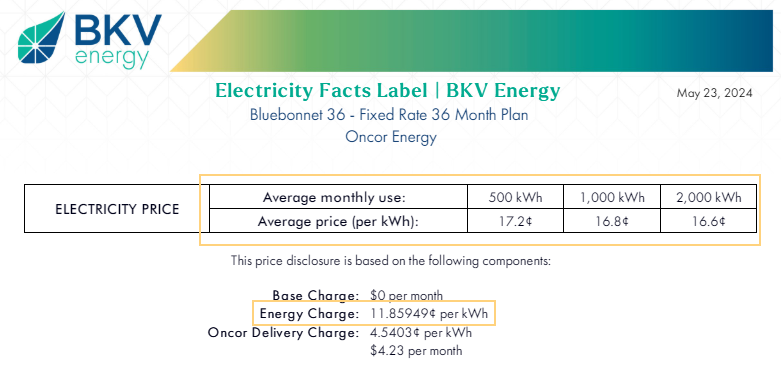Environmental Impacts of Coal
5 minute readCoal energy has powered industries for decades, but its environmental impact raises serious concerns
Home > Learning Center > How the Energy Industry Works > How to Choose the Best Electricity Provider & Plan
7 Things to Consider When Choosing an Electricity Plan
5 minute read • Last update October 2024

Tired of feeling like you’re stuck with an energy plan that doesn’t fit your needs? We hear you!
With so many options available, knowing how to choose an energy plan can seem like a job by itself. The last thing you want is to get locked into a deal with an electricity provider that doesn’t work for your lifestyle, or worse, costs you more than it should.
In this guide, we’ll show you how to choose the best energy plan in Texas. Here’s what we’ll cover:
There are a few different types of electricity rates in the Texas market, but there’s only one you should pay attention to—fixed-rate plans.
Fixed-rate plans are the best option because you’re locked into the same energy charge for the duration of your contract, even when market rates increase. That means you’re protected from the increased costs of electricity during summer months when demand on the grid is much higher.
When shopping for electricity, we always recommend looking for a fixed-rate plan.
| Rate | Explanation |
|---|---|
| Fixed | The price per kilowatt-hour remains constant for the duration of your contract. They are not impacted by fluctuations in market prices. |
| Variable | The price per kilowatt-hour can change every month during your contract. When market prices increase, the rate increases and vice versa. These rates are set at the discretion of the provider. |
| Indexed | Similar to a variable rate, the price per kilowatt-hour can change every month during your contract. The difference is that the rate is tied to a publicly available index, rather than the discretion of the provider. These plans have been banned in Texas since 2021. |
Texas electricity providers offer a wide range of contract lengths, ranging from 1 month to 3 years. Sometimes you may even find a 4 or 5-year plan.
How do you know which one is right for you? Well, each term length has its pros and cons, and some are more appropriate for one shopper over another. Let’s dive into the details of commonly offered plan terms.
| Term Length | Benefits and Considerations |
|---|---|
| 1 month | Variable plans offer short-term flexibility and are appropriate for folks who are planning to move in the near future. |
| 3 months | Similar to a 1-month plan, 3-month plans offer short-term flexibility for those anticipating a move. They are also useful for resetting your renewal cycle to the spring or fall when rates tend to be lower. |
| 6-9 months | A 6-9 month plans offers the same flexibility as shorter terms, with the added benefit of aligning your renewal period with the lower-rate seasons. This can help break a cycle of summer or winter renewals when rates are typically higher. |
| 12 months | Perfect for renters on annual leases or homeowners seeking a mid-term contract, 12-month plans offer stability without a long-term commitment. |
| 24-36 months | These longer-term plans generally come with lower rates compared to 12-month options, making them ideal for homeowners or long-term renters who prefer to avoid the hassle of yearly renewals. |
| 48 months or longer | Though less common, plans of 4 years or more can be advantageous for homeowners looking to lock in a long-term fixed rate and avoid frequent contract renewals. |
There’s no catchall-right answer for which term length is best because everyone’s circumstances are different. Weigh the pros and cons of each offering and select the option that best fits your needs and lifestyle.
Most electricity provider and plan comparison websites show the average price of a plan based on a standard usage of 2000 kWh per month. This can be misleading, especially if your energy consumption tends to vary from month to month or if your household uses significantly more or less energy than average. As a result, you may not be seeing the true cost of electricity for your specific usage needs.
How can you know what you’ll actually be paying? This brings us back to BKV Energy’s timeless mantra—always, always, always check the Electricity Facts Label.
When you look at the Electricity Facts Label, you’ll find a table showing the average price of electricity at usage levels of 500, 1000, and 2000 kWh. This breakdown helps you compare how energy prices vary based on consumption. Below that, you’ll notice a line labeled “Energy Charge” — this is the key figure to focus on when comparing plans.

When comparing plans, don’t compare the average price. Instead, look for the lowest energy charge available.
When reviewing a plan’s Electricity Facts Label, pay close attention to base charges and usage fees.
Many providers tack on these hidden costs, which can increase your bill by as much as $120 per year. These charges range typically from $4.95 to $9.95 per month or more. It’s best to avoid providers and plans that burden customers with these unnecessary charges.
| Charge | Definition |
|---|---|
| Base charge | A fixed fee that is billed to customers regardless of their electricity usage. Typically intended to cover the costs of administrative expenses incurred by the energy provider, but many providers are able to offer plans with lower rates without including a base charge, so look elsewhere. |
| Usage fee | A fee that is billed to customers when they use “too much” or “too little” electricity during a billing cycle. For example, one major Texas provider includes a $9.95 usage fee on bills when you consume less than 800 kWh. We do not recommend signing up for a plan that includes this extra cost. |
Early cancellation fees or early termination fees are applied when you leave a contract before its completion date. There are generally two types of early cancellation fees.
Our recommendation? Choose a plan that has an early termination fee that decreases the longer you’re a customer. That way if you decide to leave for any reason, it’s easier to switch providers or plans.
In Texas, many providers advertise benefits such as “free nights” or “free weekends” or $150 bill credits.
These are marketing ploys to grab your attention and lure you into expensive electricity contracts. We’ll remind you once again—always, always, always check the Electricity Facts Label.
Even with a bill credit or “free” electricity over night or on the weekends, these plans are often more costly than a simple fixed rate plan.
Why? They elevate the energy charge!
For example, a typical free nights plan will have an energy charge twice as high as a simple fixed rate plan. That means that even with free electricity at night, you’ll end up paying higher bills because most of your electricity consumption happens during the day.
There are a few more factors to pay attention to when comparing electricity providers in Texas:
At BKV Energy, we work hard to offer electricity plans that meet all of the above criteria to help Texans save big on their monthly energy bills. If you’re interested in switching to a provider with affordable fixed rates, no unnecessary fees, great customer service, a robust rewards program, and much, much more, then enter your zip code below.
Graham Lumley, Digital Marketing Manager at BKV Energy, leads digital and traditional marketing strategies, focusing on educating Texans about the state's deregulated energy market. With over 8 years of marketing experience, he creates content to help consumers understand and save on their energy bills, bringing a fresh and dynamic approach to the industry.

Coal energy has powered industries for decades, but its environmental impact raises serious concerns

Bill credit plans may look tempting, but for most Texans, they’re not the smartest way to save. Opting for a simple fixed-rate electricity plan often leads to lower, more predictable bills. Enter your zip code to explore more affordable Texas home electricity. What are bill credit plans? These electricity plans…
Get $50 off your electric bill!
Use code BKVEJOINUS50
Enter your zip code to shop BKV Energy's affordable, fixed-rate Texas electricity plans. Use the promo code for $50 off your electric bill.